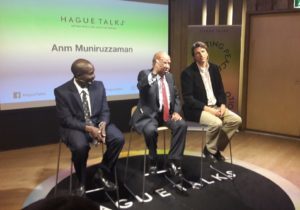Climate Change and International Security

Since its founding, EDRC’s work has included attention to climate change and since co-founding the Institute for Environmental Security (IES) in 2002, we have been engaged in a wide range of activities concerning the nexus between climate change and international security.
In particular, EDRC serves as the international secretariat for the Global Military Advisory Council on Climate Change (GMACCC).
The GMACCC is a global network of serving and retired military officers, and associated institutions, committed to highlighting the potential security implications of a changing climate and advocating action, including by the military, to minimise the risks.
Currently the Council involves 40 individual members and 9 partner organisations in 18 countries in Asia, Europe, North America and South America.
Recent activities:
Climate and Security Action - Since June 2023

GMACCC is a partner organisation in the project on Climate and Security Action through Civil-Military Cooperation in Climate-Related Emergencies (Project CASA) which studies the extent to which NATO and selected non-NATO countries have engaged their national militaries in responding to climate-related emergencies. It examines trends in these responses over time, the degree to which national militaries have the resources and mechanisms needed to prepare for and respond to these emergencies, and the consequences for force composition and readiness from participation in civil protection operations. The project does so through an interdisciplinary network of experts who are working to collect, analyse, and publish data on relevant military activities and civil-military cooperation.
NATO and Climate Change: The Next Steps, Online, 3 June 2022
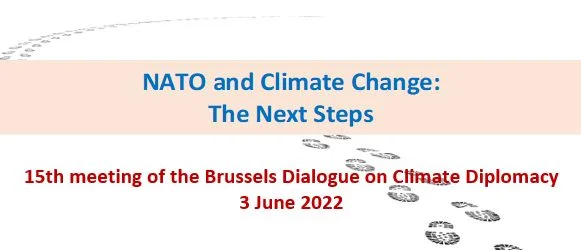
The aim of the meeting - ahead of the NATO summit, Madrid, 29-30 June 2022 - was to brief participants on NATO’s next Strategic Concept and with respect to addressing the security impacts of climate change, in particular.
Presentations also included an update on the planning for the new NATO Centre of Excellence on Climate and Security and on the NATO SPS-project “Big Earth Datacube Analytics for Transnational Security and Environment Protection - DataCube4Env Sec".
Climate Change and the Role of the Military, Online, 25 February 2022
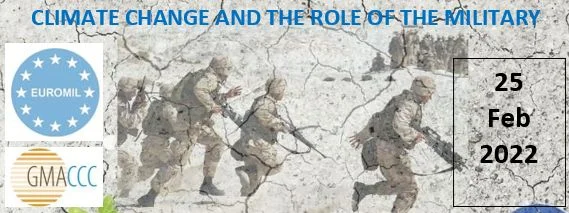
This EUROMIL event - organised in cooperation with GMACCC - focused on the EU’s actions towards the ‘greening’ of the military and civil society’s point of view on what should be done next.
Moderated by Jamie Shea, Secretary-General of the Global Military Advisory Council on Climate Change (GMACCC) speakers included Emmanuel Jacob, President, EUROMIL, Constantinos Hadjisavvas, Project Officer – Energy at European Defence Agency and Linsey Cottrell, Environmental Policy Officer at the Conflict and Environment Observatory (CEOBS).
Emmanuel Jacob underscored that military personnel need to become more informed about climate change, as it has a direct impact on their missions; training officers and soldiers to better respond and adapt to climate change is becoming more and more essential.
North-Atlantic Civil-Society Working-Group on Environment and Security (NCWES) - 2020-2021
 GMACCC was an organsiational member of the NCWES and several GMACCC members were authors and participants in the project which concluded with the publication of the report "Sustainable Peace & Security in a Changing Climate: Recommendations for NATO 2030".
GMACCC was an organsiational member of the NCWES and several GMACCC members were authors and participants in the project which concluded with the publication of the report "Sustainable Peace & Security in a Changing Climate: Recommendations for NATO 2030".
The report prepared by 30 writers and contributors contains 116 policy options and practical recommendations to be considered in the NATO 2030 process which can can help strengthen NATO in a time of new environmental-related challenges in the interest of promoting sustainable peace and security for all.
GCCC+ / IES / GMACCC event on “Climate and Security: Emerging Trends and Adaptive Strategies”, EU Pavilion, COP 25, Madrid, 11 Dec 2019
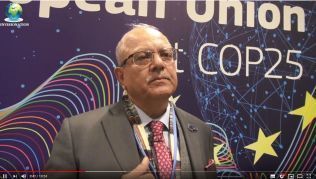 In his presentation, Lieutenant General Ghazi said that “It is important to remind ourselves constantly of "The Climate-Security Instability Cycle": climate impacts environment, environment impacts land, land impacts people, people impact threat, threat impacts security. Climate and Security are intimately linked”.
In his presentation, Lieutenant General Ghazi said that “It is important to remind ourselves constantly of "The Climate-Security Instability Cycle": climate impacts environment, environment impacts land, land impacts people, people impact threat, threat impacts security. Climate and Security are intimately linked”.
In a video interview for the Ecologist Lieutenant General Ghazi highlighted the role of military forces, how that role could evolve positively and how climate change can also lead to conflict if resource scarcity if not managed properly. > READ MORE
“International Conference on the Climate-Security Nexus: Implications for the Military – Installations, Operations and Personnel” – Co-organised with the European Organisation of Military Associations and Trade Unions (EUROMIL), European Economic and Social Committee, 24 Oct 2019
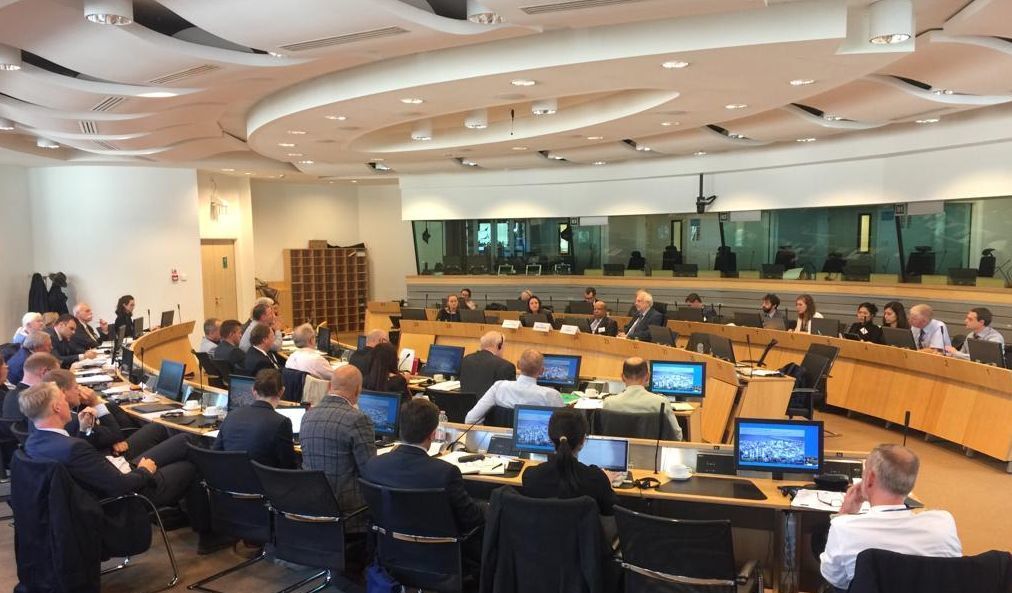 Responding to the impact of a changing climate on international, regional, national, environmental and human security requires an all-of-society / all-of-government approach.
Responding to the impact of a changing climate on international, regional, national, environmental and human security requires an all-of-society / all-of-government approach.
The conference will use a multi-stakeholder, multi-level approach to help further raise awareness of the climate-security nexus and highlight the role of the defence community in assessing the risks to stability and peace, the role of civil-military cooperation in climate change mitigation and adaptation, and the role of state and non-state actors in addressing the implications of climate change for military personnel. > READ MORE
“International Seminar on the Security Implications of Emerging Climate Altering Technologies” – Co-organised with the Belgian Federal Public Service of Foreign Affairs, Royal Military Academy, 23 Oct 2019
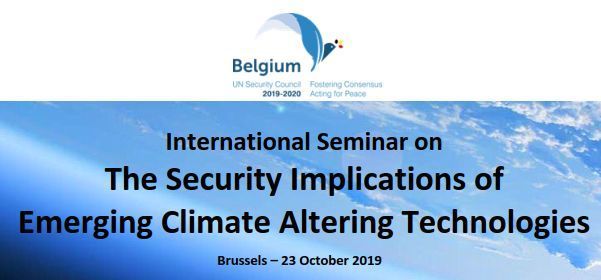 Recently more and more scientific research is aimed at mitigation alternatives through deliberate and large-scale intervention in the Earth's climate system or “geoengineering”, for example through solar radiation modification.
Recently more and more scientific research is aimed at mitigation alternatives through deliberate and large-scale intervention in the Earth's climate system or “geoengineering”, for example through solar radiation modification.
The Belgian Federal Public Service of Foreign Affairs partnered with Environment and Development Resource Center (EDRC) to organize a seminar that took stock of current academic thinking on the security implications of these unprecedented techniques. > READ MORE
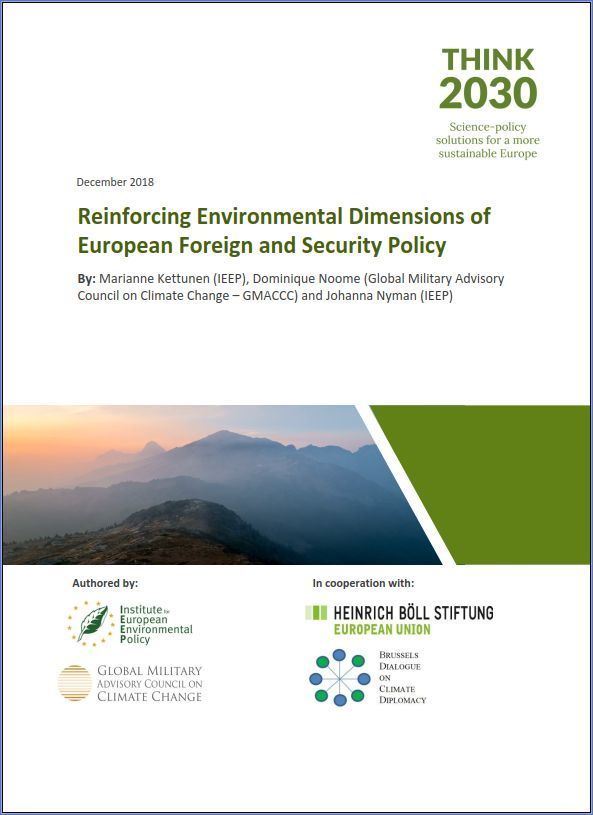 Launch of the Think2030 publication “Reinforcing Environmental Dimensions of European Foreign and Security Policy”, by Marianne Kettunen (IEEP), Dominique Noome (GMACCC) and Johanna Nyman (IEEP), Co-published by BDCD, Heinrich Böll Foundation, Institute for European Environmental Policy and the Global Military Advisory Council on Climate Change (GMACCC), Brussels, Jan 2019
Launch of the Think2030 publication “Reinforcing Environmental Dimensions of European Foreign and Security Policy”, by Marianne Kettunen (IEEP), Dominique Noome (GMACCC) and Johanna Nyman (IEEP), Co-published by BDCD, Heinrich Böll Foundation, Institute for European Environmental Policy and the Global Military Advisory Council on Climate Change (GMACCC), Brussels, Jan 2019
This paper outlines the environmental dimension of the European security policy and security-related foreign policy and discusses how the integration of environmental concerns into this policy framework could – and should – be improved to support the delivery of the 2030 Sustainability Agenda, both in the EU and globally. > READ MORE
Gen. Stephen Cheney in security discussion at climate roundtable in Washington, 24 Apr 2018
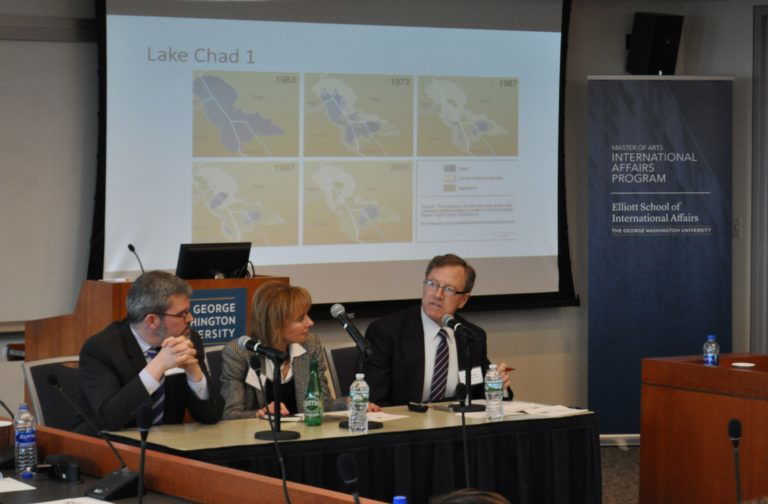 GMACCC member and CEO of the American Security Project, Brig. General Stephen Cheney (USMC-Ret.), shared his expertise as a panelist in a recent presentation and discussion session on the “Role of the military in responding to climate threats to stability.” This was part of a special meeting of The Hague Roundtable on Climate & Security that was held on 24 April in Washington D.C.
GMACCC member and CEO of the American Security Project, Brig. General Stephen Cheney (USMC-Ret.), shared his expertise as a panelist in a recent presentation and discussion session on the “Role of the military in responding to climate threats to stability.” This was part of a special meeting of The Hague Roundtable on Climate & Security that was held on 24 April in Washington D.C.
Gen. Cheney (right in photo) was joined on the panel by the Hon. John Conger and Sherri Goodman, both of the Center for Climate and Security. The Lake Chad area, Syria and Bangladesh were some of the hot spots discussed that are facing destabilizing climate impacts including drought, sea level rise and natural disasters. > READ MORE
Geoengineering Risks discussed at Planetary Security Conference, The Hague, 13 Dec 2017
GMACCC Chairman Major General Muniruzzaman (Ret.) of Bangladesh highlighted security concerns of the possible use of geoengineering as a panel member at the Planetary Security Conference in The Hague on 13 December. The workshop session, “Climate Geoengineering and its Potential Impacts on Security and Governance,” focused on objectives including:
- Evaluating challenges in governing climate geoengineering and the implications for international security, including migration flows, land grabs, threats to livelihoods, human rights and political stability.
- Sharing thoughts from experts in a range of fields speak to governance, military and security concerns as well as the implications of geoengineering for socio-economic development.
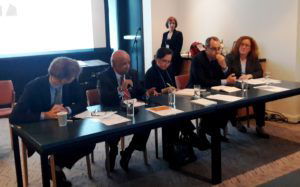 Concerns included the role of non-state actors possessing and using such technology to influence weather patterns that could lead to “weather wars.” The question of who would govern any use of geo-technology was at the front of discussions, with note that military units would most likely implement measures if climate situations became extremely dire, leading to possible militarization of the structures.
Concerns included the role of non-state actors possessing and using such technology to influence weather patterns that could lead to “weather wars.” The question of who would govern any use of geo-technology was at the front of discussions, with note that military units would most likely implement measures if climate situations became extremely dire, leading to possible militarization of the structures.
The panel called for greater debate on the general issue, because identified risks are great, and decisions should be explored at great depth. Potential “shock waves” could occur if use of the technology stopped abruptly, thus increasing climate dangers. Global holds on all deployment of such technology was agreed upon during the session as a wise step for the present.
Read the brief: Climate Geo-engineering: Uncertainties and Implications
by ANM Muniruzzaman
General Muniruzzaman (center in photo) also was a featured speaker on the same evening at The Hague Talks session that addressed “How is Climate Change Affecting Global Security?”
See more from The Hague Talks session (with video) at: http://www.haguetalks.com/speaker/muniruzzaman/
Climate, Water and migration brainstorming at Hague Roundtable, The Hague, 21 Sep 2017
IHE Delft hosted the sixth meeting of The Hague Roundtable on Climate & Security on 21 September. Rector Dr. Eddy Moors welcomed ambassadors and officers from 20 countries and 14 NGOs who came together for the half-day meeting to discuss cooperation in adapting to impacts of climate change.
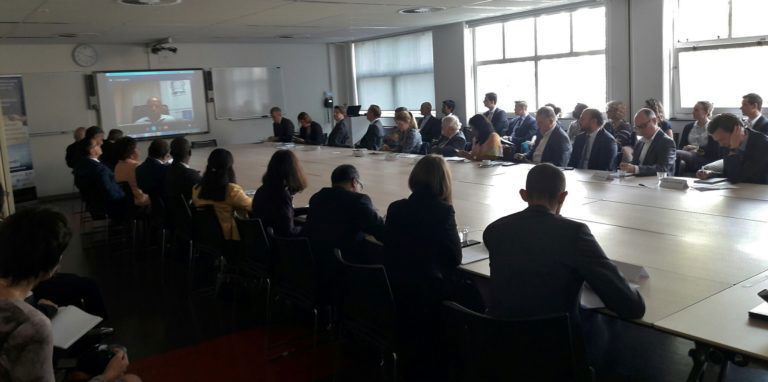 The theme of the meeting was the impact of climate, water and migration on regional stability. Participants shared their concerns and ideas on issues including too much water (flooding and sea level rise), too little water (droughts with rising temperatures), and potential mass migration and conflict. GMACCC Chairman, Major General (Ret.) A N M Muniruzzaman of Bangladesh (on screen in photo) addressed the meeting via Skype to call for global action in addressing Bangladesh’s immediate climate impact challenges that can have regional consequences.
The theme of the meeting was the impact of climate, water and migration on regional stability. Participants shared their concerns and ideas on issues including too much water (flooding and sea level rise), too little water (droughts with rising temperatures), and potential mass migration and conflict. GMACCC Chairman, Major General (Ret.) A N M Muniruzzaman of Bangladesh (on screen in photo) addressed the meeting via Skype to call for global action in addressing Bangladesh’s immediate climate impact challenges that can have regional consequences.
20 countries and 14 organizations were represented at the event that was hosted by IHE Delft Institute for Water Education. For more information, including the report of the meeting visit: www.un-ihe.org/news/ihe-delft-hosts-6th-roundtable-climate-security
Water security & cooperation highlighted at Hague Climate Roundtable, The Hague, 19 Apr 2017
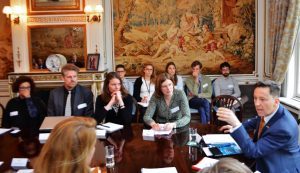 International cooperation on water-related climate risks was the theme of the fifth Hague Roundtable on Climate and Security on
International cooperation on water-related climate risks was the theme of the fifth Hague Roundtable on Climate and Security on
19 April. More than 40 representatives of embassies and non-governmental institutes shared strategies on water issues at the meeting hosted by the Ambassador of Australia to the Netherlands, H.E. Dr. Brett Mason. Threats and opportunities were examined from various perspectives with the aim of building capacities to peacefully address challenges such as sea level rise, disaster response, droughts and water-related conflict.
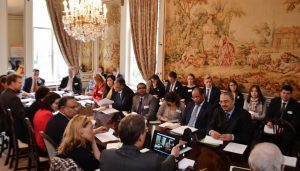 Admiral Chris Barrie (ret.) of the Global Military Advisory Council on Climate Change (GMACCC) provided insights on climate/water adaptation actions vs. needs by Skype from Australia. Admiral Barrie pointed out needed planning for potential large-scale regional migration due to sea level rise, while noting the EU’s global role in climate and security.
Admiral Chris Barrie (ret.) of the Global Military Advisory Council on Climate Change (GMACCC) provided insights on climate/water adaptation actions vs. needs by Skype from Australia. Admiral Barrie pointed out needed planning for potential large-scale regional migration due to sea level rise, while noting the EU’s global role in climate and security.
n presentations, Mr. Jan Busstra, Head of Unit on Water Policy at the Dutch Ministry of Infrastructure and Environment, opened an information exchange on initiatives such as the UN/World Bank High Level Panel on Water that comprises 11 Heads of State. It was stated that local actions of ‘informal structures’ (like the Roundtable) can support positive outcomes within ‘formal structures’ such as global programmes and conferences. Also, representatives from Deltares highlighted multi-stakeholder programmes of the institute on water resource security and conflict, as well as specifics on ground water engineering for fresh water and related adaptation in small island states.
Read the report of the 5th Hague Roundtable on Climate & Security.
GMACCC particpates at Future Force Conference, The Hague, 9-10 Feb 2017
 The Dutch Minister of Defence and the Dutch Chief of Defence will host the Future Force Conference in The Hague, the Netherlands. The Future Force Conference is a highly innovative international networking conference addressing the theme: ‘From partnerships to ecosystems: combining our efforts for a more secure world’.
The Dutch Minister of Defence and the Dutch Chief of Defence will host the Future Force Conference in The Hague, the Netherlands. The Future Force Conference is a highly innovative international networking conference addressing the theme: ‘From partnerships to ecosystems: combining our efforts for a more secure world’.
GMACCC Chair, Major General Muniruzzaman (Ret.) of Bangladesh on 9-10 February 2017 highlighted the risks of a changing climate to global security and offered potential solutions to mitigate impacts that are already taking place. Speaking at the plenary and in a breakout session of the Future Force Conference in The Hague, the Netherlands, General Muniruzzaman emphasised the need to “climatise” military operations and equipment to meet changing mission conditions, while engaging with policy makers to peacefully meet with future mass migration, as vast areas of nation states are being lost to sea-level rise. > READ MORE and VIEW VIDEOS of the conference.
Videos from Planetary Conference and BBC news with GMACCC
GMACCC Members attend 2nd Planetary Conference, The Hague, 5-6 Dec 2016
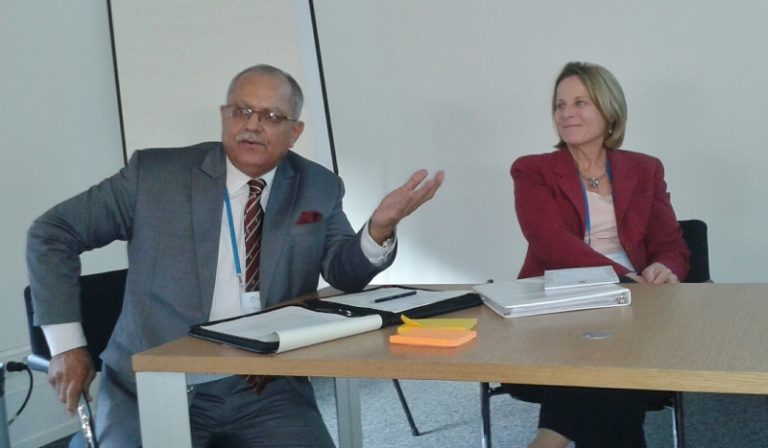 (Photo: General Ghazi and Alice Hill on the panel of the working group on climate risk for defence and intelligence)Lieutenant General Tariq Waseem Ghazi (Ret.) of Pakistan and Rear Admiral Neil Morisetti (Ret.) of the UK were featured in a highlight video wrap from the 2016 Planetary Security Conference held at the Peace Palace in The Hague on 5-6 December 2016.
(Photo: General Ghazi and Alice Hill on the panel of the working group on climate risk for defence and intelligence)Lieutenant General Tariq Waseem Ghazi (Ret.) of Pakistan and Rear Admiral Neil Morisetti (Ret.) of the UK were featured in a highlight video wrap from the 2016 Planetary Security Conference held at the Peace Palace in The Hague on 5-6 December 2016.
GMACCC Members brief members of UK Parliament, London, Dec 2016
 GMACCC members Brigadier General Stephen A. Cheney, USMC (Ret.), Rear Admiral Neil Morisetti, RN (Ret.) and Major General Muniruzzaman (Retd). took part in a series of events in London including a conference on 1 December 2016 at the Royal Institute of International Affairs – Chatham House entitled “Security and Climate Change: Are we Living in 'The Age of Consequences'?”
GMACCC members Brigadier General Stephen A. Cheney, USMC (Ret.), Rear Admiral Neil Morisetti, RN (Ret.) and Major General Muniruzzaman (Retd). took part in a series of events in London including a conference on 1 December 2016 at the Royal Institute of International Affairs – Chatham House entitled “Security and Climate Change: Are we Living in 'The Age of Consequences'?”
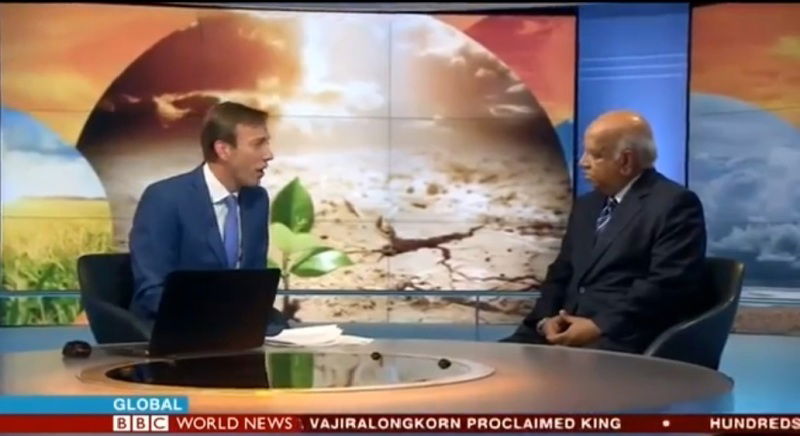 Other activities included GMACCC members briefing of a group of parliamentarians at the House of Commons chaired by Lord Robathan former State Minister for Defence, a briefing/consultative meeting with the Chair of the Defence Select Committee Dr. Julian Lewis MP and a meeting with experts from the Royal United Services Institute for Defence and Security Studies (RUSI) where they discussed Climate Change and its impact on global security.
Other activities included GMACCC members briefing of a group of parliamentarians at the House of Commons chaired by Lord Robathan former State Minister for Defence, a briefing/consultative meeting with the Chair of the Defence Select Committee Dr. Julian Lewis MP and a meeting with experts from the Royal United Services Institute for Defence and Security Studies (RUSI) where they discussed Climate Change and its impact on global security.
Cheney and Muniruzzaman appeared on BBC World News Television in their primetime show ‘Global’ discussing the documentary ‘Age of Consequences’ in which they both appear.
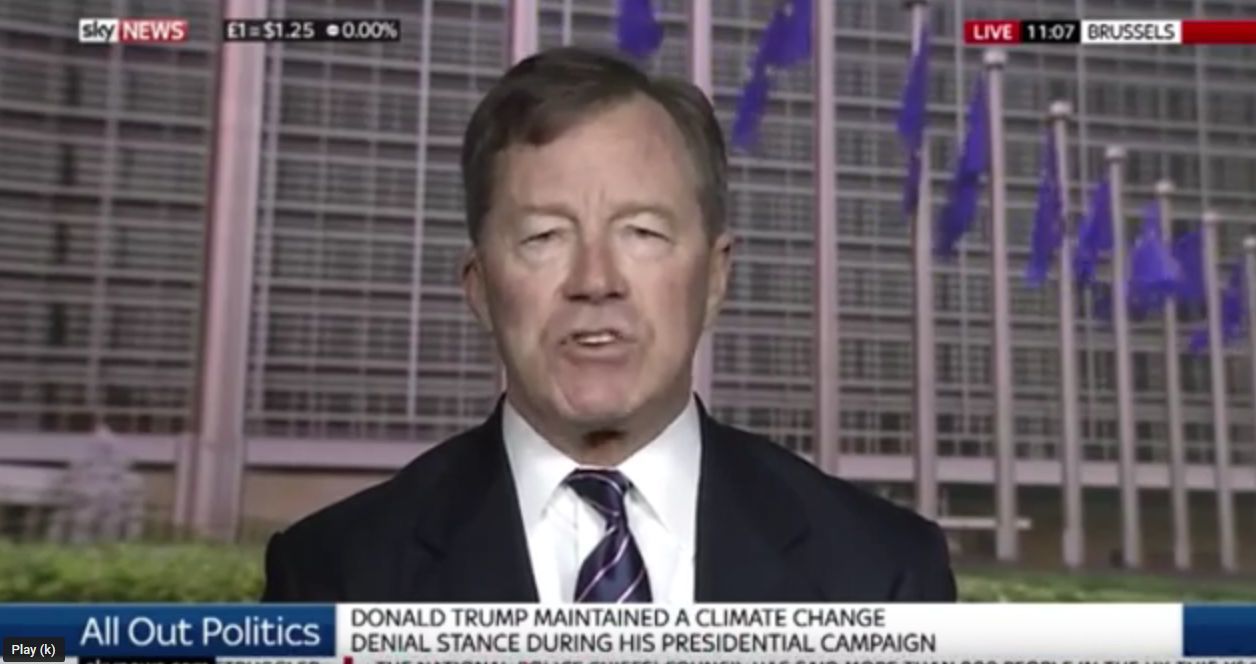 Earlier Brig. Gen. Stephen Cheney also held an interview with Sky News in Brussels to discuss the security risks posed by climate change and the necessity of the incoming administration to join the global community that has acknowledged its threat. Mass migration, spikes in terrorism, civil war, and the costs of infrastructure replacement are just a few of the effects caused by climate change. These are costly and BGen. Cheney expressed his hope that the business and cost benefit analysis will be received by the incoming administration and acted upon.
Earlier Brig. Gen. Stephen Cheney also held an interview with Sky News in Brussels to discuss the security risks posed by climate change and the necessity of the incoming administration to join the global community that has acknowledged its threat. Mass migration, spikes in terrorism, civil war, and the costs of infrastructure replacement are just a few of the effects caused by climate change. These are costly and BGen. Cheney expressed his hope that the business and cost benefit analysis will be received by the incoming administration and acted upon.
U.S. and other military leaders highlight strategic climate risks, 19 Nov 2016
 GMACCC member Brigadier General Wendell Christopher King (Ret.) of the United States has issued a statement on 21 November following COP 22 in Marrakech that highlights the need for the U.S. Government to heed the research-based advice of experts and take climate change impacts with the role of the military on security and stability very seriously:
GMACCC member Brigadier General Wendell Christopher King (Ret.) of the United States has issued a statement on 21 November following COP 22 in Marrakech that highlights the need for the U.S. Government to heed the research-based advice of experts and take climate change impacts with the role of the military on security and stability very seriously:
“Climate change poses a threat to U.S. national security. This risk has been identified by the Department of Defense and the National Intelligence Council. U.S. engagement in national security and diplomatic forums on this critical issue remains a paramount concern, and I hope that the new administration carefully considers the scientific and security data in addressing threats posed by climate change.”
 In addition, at the 2016 Halifax International Security Forum, 18 - 20 November 2016, senior military officers warned that “climate change could severely impact global security as sea levels rise and prolonged droughts grip poorer nations.” Also at the Forum, Netherlands General Tom Middendorp warned that climate change is fueling war worldwide.
In addition, at the 2016 Halifax International Security Forum, 18 - 20 November 2016, senior military officers warned that “climate change could severely impact global security as sea levels rise and prolonged droughts grip poorer nations.” Also at the Forum, Netherlands General Tom Middendorp warned that climate change is fueling war worldwide.
See the article with video from the Herald News, “Generals sound alarm over climate change at Halifax International Security Forum”
South Asia paper presented at Hague Roundtable, The Hague, 25 Oct 2016
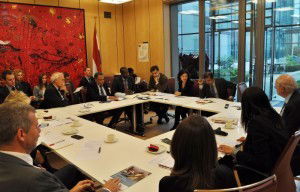 Fifteen countries and eight organisations were represented as Wouter Veening, Chairman of the Institute for Environmental Security (IES), presented the latest GMACCC publication at the Hague Roundtable on Climate and Security. The event was held on 25 October 2016 at the Embassy of Canada to the Netherlands.
Fifteen countries and eight organisations were represented as Wouter Veening, Chairman of the Institute for Environmental Security (IES), presented the latest GMACCC publication at the Hague Roundtable on Climate and Security. The event was held on 25 October 2016 at the Embassy of Canada to the Netherlands.
The May 2016 GMACCC publication “Climate Change & Security In South Asia: Cooperating For Peace” analyses current and likely climate impacts on political stability, livelihoods and conflict – and the report encourages regional cooperation to help mitigate risks. GMACCC Chairman, Major General Muniruzzaman (Ret.) of Bangladesh, addressed the Roundtable by video message to introduce the report. See also the interview discussing “climate wars and walls” with General Muniruzzaman in The Independent.
The Hague Roundtable on Climate and Security is an ongoing initiative that brings together stakeholders for sharing information and identifying opportunities for cooperation in addressing climate risks to peace and sustainable development. The Roundtable meetings also support the annual Planetary Security Conference in the Netherlands by providing an interactive platform on the subject throughout the year. > READ MORE
GMACCC Call for Action Presented at COP 21, Paris, 7 Dec 2015
 In the time since the Global Military Advisory Council on Climate Change (GMACCC) issued its first Call for Action in 2009 at Copenhagen COP 15, the view that the military should have a key role in preparation and response mechanisms to combat the impacts of climate change has grown into a needed reality. Defense forces around the world increasingly need to integrate with all stakeholders in mitigating potential climate related conflict situations. It is within this context that the military, equipped with the best science, should have as its mission to identify risk areas and prepare responses to meet climate related challenges to global stability.
In the time since the Global Military Advisory Council on Climate Change (GMACCC) issued its first Call for Action in 2009 at Copenhagen COP 15, the view that the military should have a key role in preparation and response mechanisms to combat the impacts of climate change has grown into a needed reality. Defense forces around the world increasingly need to integrate with all stakeholders in mitigating potential climate related conflict situations. It is within this context that the military, equipped with the best science, should have as its mission to identify risk areas and prepare responses to meet climate related challenges to global stability.
The GMACCC Call for Action 2015 was presented on at the COP 21 Paris on Monday 7 December during a GMACCC event at the Netherlands pavilion. The Call emphasises the need to adapt to climate stress points with the military as a key contributor to climate preparedness in the wider community of diplomats, development experts, intelligence experts and academics. High levels of global cooperation are needed to help mitigate risks to national and international stability from resource scarcity, extreme weather events, migration, disease, sea level rise and other threats to human security.
Climate and Security Action is Focus at U.S. Embassy Event, The Hague, 27 May 2015
 The Institute for Environmental Security (IES) in cooperation with the U.S. Embassy in The Hague highlighted climate change risks to human security, and possible actions to mitigate emerging and present dangers at an event in The Hague on 27 May. Some 40 guests came from various embassies in The Hague, the Dutch Government, the Holy See and prominent stakeholder organizations to attend the meeting.
The Institute for Environmental Security (IES) in cooperation with the U.S. Embassy in The Hague highlighted climate change risks to human security, and possible actions to mitigate emerging and present dangers at an event in The Hague on 27 May. Some 40 guests came from various embassies in The Hague, the Dutch Government, the Holy See and prominent stakeholder organizations to attend the meeting.
Methods of actively engaging government stakeholders leading up to, and at the 2015 COP 21 in Paris was at the center of the event. While COP negotiations are focused on emissions and long-term goals, immediate climate-related risks such as drought, mass migration, extreme weather events, rising sea-levels and water conflict should be addressed with more urgency in global platforms. A primary aim is to gain support for the formulation of policy-based approaches that can increase political and social stability – particularly in fragile states of regions already experiencing more extreme climate effects.
Activities of the Global Military Advisory Council on Climate Change (GMACCC), including recent and upcoming publications, were center in the discussion. Initiated by IES in 2009, GMACCC is a global network of serving and retired military officers and institutions committed to highlighting security implications of a changing climate and advocating action to minimize risks.
Major General Muniruzzaman (Ret.) Bangladesh, GMACCC Chairman, in his presentation delivered an inclusive call to action stating also that people displaced by climate change are increasingly a potential source of recruitment for violent extremist groups. This follows remarks in May by U.S. President Barack Obama stating that “climate change constitutes a serious threat to global security, an immediate risk to our national security, and, make no mistake, it will impact how our military defends our country.”
Wouter Veening, Chairman and President of IES, chaired the meeting that included presentations from Gregory D. LoGerfo, U.S. Embassy Political and Economic Counselor; Thibault Cornut-Gentille, French Embassy First Secretary; Alexander Verbeek, Dutch Foreign Ministry Strategic Policy Advisor; Tom Spencer, GMACCC/IES Co-Chairman; and Ronald A. Kingham, Director of IES.

GMACCC Publications include:
- Reinforcing Environmental Dimensions of European Foreign and Security Policy, published in December 2018, outlines the environmental dimension of the European security policy and security-related foreign policy and discusses how the integration of environmental concerns into this policy framework could – and should – be improved to support the delivery of the 2030 Sustainability Agenda, both in the EU and globally.
- Climate Change and Security in South Asia: Cooperating for Peace, published in May 2016, warns that a recent drought in India which has affected over 330 million people – causing displacement and threatening farms –is just the first hint of how climate change could destabilise the South Asian region, unless steps are taken to address the threat posed by a warming, resource-scarce world. The report by GMACCC authors Lt. General Tariq Waseem Ghazi (Ret.) of Pakistan, Maj. General A.N.M. Muniruzzaman (Ret.) of Bangladesh, and Air Marshall A.K. Singh (Ret.) of India recommends that the region’s leaders strengthen cooperation to reduce the potential for widespread human suffering and further instability.
- Climate Change & Security in Africa: Clear Risks, Nuanced Impacts addresses links between climate patterns and conflict in Africa in order to raise awareness of present and emerging climate-related risks in the region. The December 2014 publication focuses on climate-related stability factors in Mali, Darfur and South Sudan – including food security, migration.
- Climate Change: Implications For Defence reviews the ways climate change is challenging global security and the role the military can play in addressing that challenge. The June 2014 publication is based closely on the Fifth Assessment Report from the Intergovernmental Panel on Climate Change, a comprehensive and relevant analysis of our changing climate.
For more information visit the GMACCC website at: http://gmaccc.org/
